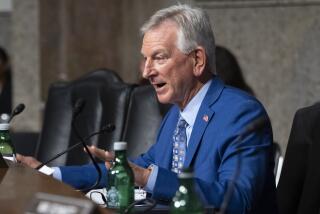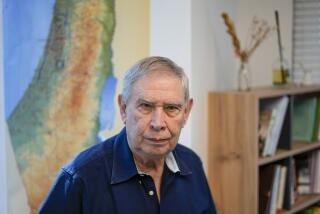UPDATE / SOLDIERLY UNREST : Army Colonel Putting New Military Pressure on Argentine President
- Share via
BUENOS AIRES — Military politics, a perennial preoccupation in Argentina, is producing a new rash of problems for the civilian government of President Carlos Saul Menem.
The latest focus of trouble is Mohammed Ali Seineldin, a suspended army colonel who led an abortive barracks revolt in December, 1988. He served nine months in detention for that affair but has since returned to the arena of military politics.
On Oct. 20, Seineldin delivered an ominous letter to Menem’s official residence. The letter warned that dissatisfaction in the army could produce events “so grave that neither you nor I are able to specify them.” He did protest what he called a plan to neutralize and remove outspokenly disgruntled officers.
The government responded by asking that the colonel be punished for writing the letter, and the army commander ordered his detention for 60 days.
Although Seineldin is not believed to be plotting a coup, he clearly is attempting to muster support among military men and civilians for his right-wing, nationalist answers to Argentina’s severe economic problems. His pronouncements are aimed especially at army officers and noncommissioned officers who are unhappy about low military prestige, poor military pay and reduced military budgets.
Menem, who took office in July, 1989, has slashed government spending and held down salaries in an effort to control inflation that reached 3,000% in 1989. The cuts have had a severe impact on the armed forces.
Seineldin once was an ally of retired Lt. Col. Aldo Rico, who led barracks mutinies in April, 1987, and January, 1988. The two men were the most prominent leaders of an army faction that was called the “Painted Faces” because of facial camouflage used during their uprisings.
Rico now appears to be going his separate way, venturing more deeply into civilian politics. In mid-October he announced that he will be a candidate next year for governor of Buenos Aires province.
The armed forces governed Argentina from 1976 to December, 1983. In the late 1970s, about 9,000 Argentines were killed and thousands more were tortured in a ruthless “dirty war” between security forces and leftist subversives.
Under civilian rule, the government prosecuted scores of military officers, including generals who presided over the military regime, for violations of human rights. But military pressures have resulted in government pardons for all but a few.
In October, 1989, Menem pardoned 39 military and police officers charged with violations in the “dirty war.” He also pardoned more than 100 officers who took part in the 1987 and 1988 revolts, including Seineldin and Rico.
Menem has promised that he will pardon former President Jorge Videla, the army general who led the 1976 coup; former President Roberto Viola, the general who succeeded Videla, and former Adm. Emilio Massera, a member of Videla’s junta. Menem said the pardons are needed for “national reconciliation.”
Nevertheless, the planned pardons could be a new source of political trouble. According to results of a recent public opinion poll, 70% of those interviewed oppose them.
On Oct. 12, thousands of Argentines marched through Buenos Aires streets to protest Menem’s plan. The demonstration was organized by a movement of 25 human rights organizations and political parties called the National Commission Against the Pardon.
The government, however, seems more worried about military pressure than civilian protests. “No matter how many movements they create, it is decided that the pardon will be granted,” Menem has said.
More to Read
Sign up for Essential California
The most important California stories and recommendations in your inbox every morning.
You may occasionally receive promotional content from the Los Angeles Times.










